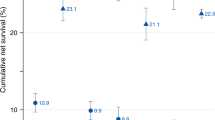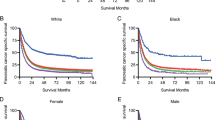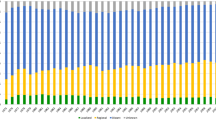Abstract
Background
Pancreatic cancer incidence is increasing in younger populations. Differences between early onset pancreatic cancer (EOPC) and later onset pancreatic cancer (LOPC), and how these should inform management warrant exploration in the contemporary setting.
Methods
A prospectively collected multi-site dataset on consecutive pancreatic adenocarcinoma patients was interrogated. Patient, tumour, treatment, and outcome data were extracted for EOPC (≤50 years old) vs LOPC (>50 years old).
Results
Of 1683 patients diagnosed between 2016 and 2022, 112 (6.7%) were EOPC. EOPC more frequently had the tail of pancreas tumours, earlier stage disease, surgical resection, and trended towards increased receipt of chemotherapy in the curative setting compared to LOPC. EOPC more frequently received 1st line chemotherapy, 2nd line chemotherapy, and chemoradiotherapy than LOPC in the palliative setting. Recurrence-free survival was improved for the tail of pancreas EOPC vs LOPC in the resected setting; overall survival was superior for EOPC compared to LOPC across the resected, locally advanced unresectable and metastatic settings.
Conclusions
EOPC remains a small proportion of pancreatic cancer diagnoses. The more favourable outcomes in EOPC suggest these younger patients are overall deriving benefits from increased treatment in the curative setting and increased therapy in the palliative setting.
This is a preview of subscription content, access via your institution
Access options
Subscribe to this journal
Receive 24 print issues and online access
$259.00 per year
only $10.79 per issue
Buy this article
- Purchase on Springer Link
- Instant access to full article PDF
Prices may be subject to local taxes which are calculated during checkout




Similar content being viewed by others
Data availability
The data underlying this study will be shared on reasonable request to the corresponding author.
References
Siegel RL, Miller KD, Fuchs HE, Jemal A. Cancer statistics, 2022. CA A Cancer J Clin. 2022;72:7–33.
Sung H, Siegel RL, Rosenberg PS, Jemal A. Emerging cancer trends among young adults in the USA: analysis of a population-based cancer registry. Lancet Public Health. 2019;4:e137–47.
Ward EM, Sherman RL, Henley SJ, Jemal A, Siegel DA, Feuer EJ, et al. Annual report to the nation on the status of cancer, featuring cancer in men and women age 20–49 years. JNCI: J Natl Cancer Inst. 2019;111:1279–97.
Australian Institute of Health and Welfare. Cancer data in Australia. Canberra: AIHW; 2020.
Conroy T, Desseigne F, Ychou M, Bouché O, Guimbaud R, Bécouarn Y, et al. FOLFIRINOX versus gemcitabine for metastatic pancreatic cancer. New Engl J Med. 2011;364:1817–25.
Von Hoff DD, Ervin T, Arena FP, Chiorean EG, Infante J, Moore M, et al. Increased survival in pancreatic cancer with nab-paclitaxel plus gemcitabine. New Engl J Med. 2013;369:1691–703.
Janssen QP, Buettner S, Suker M, Beumer BR, Addeo P, Bachellier P, et al. Neoadjuvant FOLFIRINOX in patients with borderline resectable pancreatic cancer: a systematic review and patient-level meta-analysis. J Natl Cancer Inst. 2019;111:782–94.
Neoptolemos JP, Palmer DH, Ghaneh P, Psarelli EE, Valle JW, Halloran CM, et al. Comparison of adjuvant gemcitabine and capecitabine with gemcitabine monotherapy in patients with resected pancreatic cancer (ESPAC-4): a multicentre, open-label, randomised, phase 3 trial. Lancet. 2017;389:1011–24.
Conroy T, Hammel P, Hebbar M, Ben Abdelghani M, Wei AC, Raoul J-L, et al. FOLFIRINOX or gemcitabine as adjuvant therapy for pancreatic cancer. New Engl J Med. 2018;379:2395–406.
Ansari D, Althini C, Ohlsson H, Andersson R. Early-onset pancreatic cancer: a population-based study using the SEER registry. Langenbeck’s Arch Surg. 2019;404:565–71.
Tsang ES, Topham JT, Karasinska JM, Lee MKC, Williamson LM, Mendis S, et al. Delving into early-onset pancreatic ductal adenocarcinoma: how does age fit in? Clin Cancer Res. 2021;27:246–54.
Duffy A, Capanu M, Allen P, Kurtz R, Olson SH, Ludwig E, et al. Pancreatic adenocarcinoma in a young patient population—12-year experience at Memorial Sloan Kettering Cancer Center. J Surg Oncol. 2009;100:8–12.
Ben-Aharon I, Elkabets M, Pelossof R, Yu KH, Iacubuzio-Donahue CA, Leach SD, et al. Genomic landscape of pancreatic adenocarcinoma in younger versus older patients: does age matter? Clin Cancer Res. 2019;25:2185–93.
Ordonez JE, Hester CA, Zhu H, Augustine M, Porembka MR, Wang SC, et al. Clinicopathologic features and outcomes of early-onset pancreatic adenocarcinoma in the United States. Ann Surg Oncol. 2020;27:1997–2006.
Saadat LV, Chou JF, Gonen M, Soares KC, Kingham TP, Varghese AM, et al. Treatment patterns and survival in patients with early-onset pancreatic cancer. Cancer. 2021;127:3566–78.
Ntala C, Debernardi S, Feakins RM, Crnogorac-Jurcevic T. Demographic, clinical, and pathological features of early onset pancreatic cancer patients. BMC Gastroenterol. 2018;18:139.
Piciucchi M, Capurso G, Valente R, Larghi A, Archibugi L, Signoretti M, et al. Early onset pancreatic cancer: risk factors, presentation and outcome. Pancreatology. 2015;15:151–5.
BioGrid Australia. Cancer Data Collection Software: BioGrid Australia. 2020 [cited 2020 Oct 12]. Available from: https://www.biogrid.org.au/page/110/cancer-data-collection-software.
van Dam JL, Janssen QP, Besselink MG, Homs MYV, van Santvoort HC, van Tienhoven G, et al. Neoadjuvant therapy or upfront surgery for resectable and borderline resectable pancreatic cancer: a meta-analysis of randomised controlled trials. Eur J Cancer. 2022;160:140–9.
Barreto SG, Shukla PJ, Shrikhande SV. Tumors of the pancreatic body and tail. World J Oncol. 2010;1:52–65.
Artinyan A, Soriano PA, Prendergast C, Low T, Ellenhorn JDI, Kim J. The anatomic location of pancreatic cancer is a prognostic factor for survival. HPB. 2008;10:371–6.
Lau MK, Davila JA, Shaib YH. Incidence and survival of pancreatic head and body and tail cancers: a population-based study in the United States. Pancreas. 2010;39:458–62.
Tomasello G, Ghidini M, Costanzo A, Ghidini A, Russo A, Barni S, et al. Outcome of head compared to body and tail pancreatic cancer: a systematic review and meta-analysis of 93 studies. J Gastrointest Oncol. 2019;10:259–69.
Wainberg ZA, Melisi D, Macarulla T, Pazo Cid R, Chandana SR, De La Fouchardière C, et al. NALIRIFOX versus nab-paclitaxel and gemcitabine in treatment-naive patients with metastatic pancreatic ductal adenocarcinoma (NAPOLI 3): a randomised, open-label, phase 3 trial. Lancet. 2023;402:1272–81.
Santucci J, Tacey M, Thomson B, Michael M, Wong R, Shapiro J, et al. Impact of first-line FOLFIRINOX versus Gemcitabine/Nab-Paclitaxel chemotherapy on survival in advanced pancreatic cancer: evidence from the prospective international multicentre PURPLE pancreatic cancer registry. Eur J Cancer. 2022;174:102–12.
Mendis S, Lipton L, Ananda S, Michael M, Mclachlan S-A, Thomson B, Knowles B, Fox A, Loveday B, Nikfarjam M, Usatoff V, Shapiro J, Clarke K, Pattison S, Chee CE, Zielinski R, Wong R, Gibbs P, Lee B. American Society of Clinical Oncology (ASCO) 2022 Gastrointestinal Cancers Symposium, January 20–22 2022. J Clin Oncol. 2022;40 (4_suppl):533.
Acknowledgements
Michael Harold and Julie Johns at WEHI and BioGrid Australia for data collection and collation. Joanna Oakley for editorial assistance. Eastern Health Research Foundation—APH Philanthropic Foundation Research and Innovation Grant 2020. Epworth Medical Foundation. Poster presentation at the American Society of Clinical Oncology (ASCO) 2022 Gastrointestinal Cancers Symposium, January 20–22 2022 [26].
Funding
The PURPLE translational registry receives philanthropic support from the Hemstritch Foundation and the Pancare Foundation. BL is the recipient of the Hemstritch Centenary Fellowship.
Author information
Authors and Affiliations
Contributions
SM was involved in conception, design, analysis, drafting and revision. SM had full access to the data and holds final responsibility for the decision to submit for publication. LL acquired the data, was involved in the design, revised the manuscript and approved the final version. YHT interpreted results, revised the manuscript and approved the final version. SA acquired data, revised the manuscript and approved the final version. MM acquired data, revised the manuscript and approved the final version. SAM acquired data, revised the manuscript and approved the final version. BT acquired data, revised the manuscript and approved the final version. BJ acquired data, revised the manuscript and approved the final version. BK acquired data, revised the manuscript and approved the final version. AF acquired data, revised the manuscript and approved the final version. MN acquired data, revised the manuscript and approved the final version. VA acquired data, revised the manuscript and approved the final version. JS acquired data, revised the manuscript and approved the final version. KC acquired data, revised the manuscript and approved the final version. SP acquired data, was involved in the design, revised the manuscript and approved the final version. CEC acquired data, revised the manuscript and approved the final version. RZ acquired data, revised the manuscript and approved the final version. RW acquired data, revised the manuscript and approved the final version. PG was involved in the conception, design, revised the manuscript and approved the final version. BL was involved in conception, design, revised the manuscript and approved the final version.
Corresponding author
Ethics declarations
Competing interests
The authors declare no competing interests.
Ethics approval and consent to participate
The (Pancreatic Cancer: Understanding Routine Practice and Lifting End Results (PURPLE). A Prospective Pancreatic Cancer Clinical Registry) PURPLE registry has ethics approval through the Melbourne Human Research Ethics Committee (Ethics approval number 2016.200), is listed on the Australia New Zealand Clinical Trials Registry, registration number ACTRN12617001474347, and operates under a waiver of consent. The Human Research Ethics Committee at each of the participating sites approved this study (HREC/17/MH/38). The study was performed in accordance with the Declaration of Helsinki.
Consent for publication
Not applicable.
Additional information
Publisher’s note Springer Nature remains neutral with regard to jurisdictional claims in published maps and institutional affiliations.
Supplementary information
Rights and permissions
Springer Nature or its licensor (e.g. a society or other partner) holds exclusive rights to this article under a publishing agreement with the author(s) or other rightsholder(s); author self-archiving of the accepted manuscript version of this article is solely governed by the terms of such publishing agreement and applicable law.
About this article
Cite this article
Mendis, S., Lipton, L., To, Y.H. et al. Early onset pancreatic cancer—exploring contemporary treatment and outcomes using real-world data. Br J Cancer (2024). https://doi.org/10.1038/s41416-024-02619-5
Received:
Revised:
Accepted:
Published:
DOI: https://doi.org/10.1038/s41416-024-02619-5



